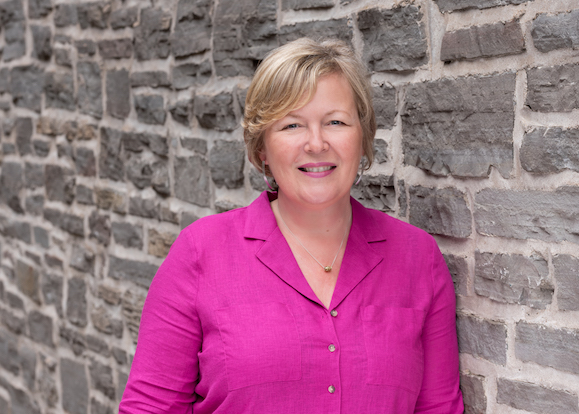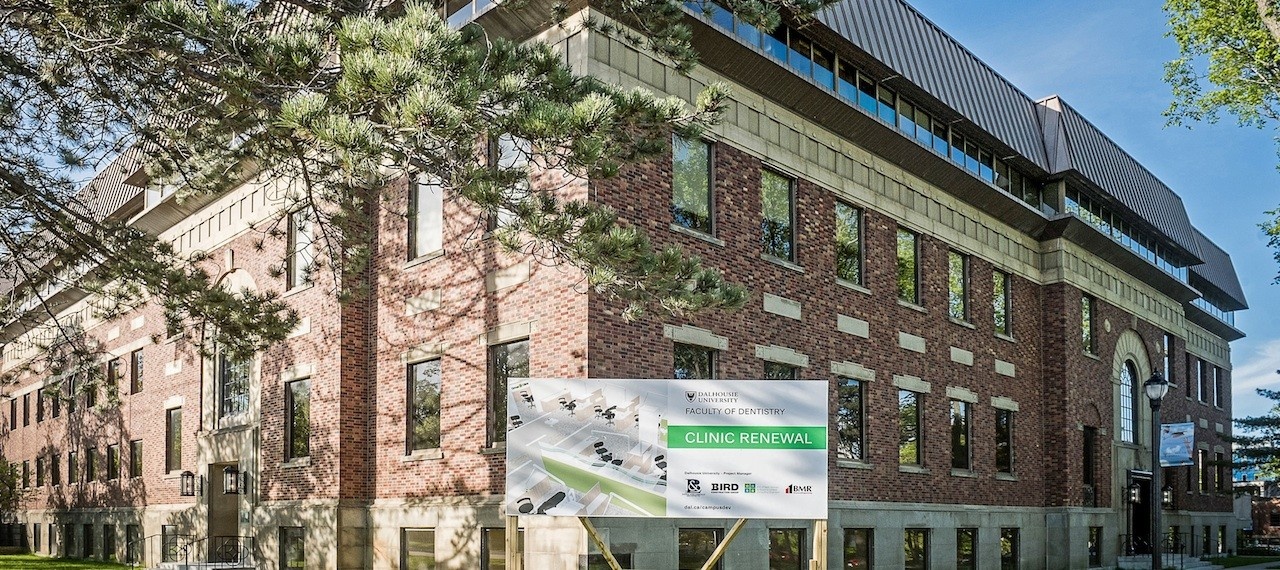News
» Go to news mainMental health is health: An interview with Starr Cunningham, the 2022 J D McLean speaker

**POSTPONED until January 19, same time and same location. Please re-register so that we know numbers for refreshments.
-------------------------------------
The 2022 J D McLean Lecture was originally scheduled to take place on September 23, 2022 but was cancelled because of bad weather. It will now take place on Thursday, January 12, 2023, 5:30-7:00, in room 3156 of the Dentistry Building.
This year’s speaker is Starr Cunningham, president and CEO of the Mental Health Foundation of Nova Scotia. Regular care and identifying problems early are just as important for our mental health as they are for our oral health, she says.
Q: How did you make the transition from being a journalist to the president and CEO of the Mental Health Foundation of Nova Scotia and what was the thinking behind that decision?
Starr Cunningham: Well, I was ready for a change and this opportunity spoke to me for a number of reasons. The first is that I knew the role was about connecting with people and communication. After 23 years in the newsroom, I had confidence in my abilities to do that. These softer skills can be more difficult to learn if you don’t have them already. So, I made the transition, not knowing how to make a strategic plan operational or how to build a dashboard, and all those things that you would think of when you think about the role of president and CEO, but I felt that I could learn those skills.
Another reason was that, as a journalist, I talked to a lot of different people. I was particularly struck by those who bravely shared their stories and talked about their struggles with mental illness. That really resonated with me.
The third reason it was a natural transition for me – and it took me a while to be able to say this aloud – is that I live with mental illness myself. I have a psychiatrist, I attend weekly therapy sessions, I take several medications and I regularly check to see where I am on the mental health continuum. When this opportunity came up, I knew that people felt a connection to me because I'd been in their homes for so many years. I saw this as an opportunity to help raise awareness about something that's really difficult to talk about and I felt compelled to step into this role to try to help change the way people think.
Q: Could you please talk a bit about some of the topics your lecture will cover and why they are important?
SC: The lecture will be quite broad, because it’s a broad topic. The first thing I want to stress is that mental health is health. You can’t separate the two, in much the same way that you cannot separate the mouth and teeth from the rest of the body. I’ll talk about the importance of triage and explain how you can triage mental health problems in the same way as you might triage a broken ankle. I’ll also talk about eradicating stigma and the importance of self-care. You can’t pour from an empty cup. When you’re under pressure, looking after yourself is paramount – and that means more than just running a bath.
At the Mental Health Foundation of Nova Scotia, we partner with our friends at St. John Ambulance to provide a Mental Health First Aid Community Grant. It provides critical training that can be used to help someone who is experiencing a mental health problem. It teaches participants how to recognize the warning signs and to be able to help someone who is experiencing difficulties. It emphasizes the importance of being a non-judgmental listener and provides the skills to guide someone to the supports they may need.
I think there’s a belief that it’s potentially a dangerous topic and could give someone ideas. But it’s important to ask someone whether they think they might hurt themselves because it helps to assess the risk they may be under. Pretending doesn’t make it go away.
Tackling the hurdle of stigma
Q: Are there ways in which oral health students and professionals can protect themselves from some of the risks?
SC: Health-care professionals tend to hold themselves to a higher standard in a lot of ways. Their role is to care for others and they can feel pressure to cover up how they are feeling and not ask for help. They are regarded as leaders and often don’t want to appear vulnerable. They also don’t always look after themselves. They think ‘this can’t happen to me’.
Students also find themselves under pressure and don’t want to say the wrong thing or ask for help in case it gives the impression that they can’t cope. But in that situation, doing nothing is the worst thing.
Stigma is the big hurdle we must eradicate. We will do that by being open about our struggles and making use of the sources of help available to us. Here at the Foundation, everyone has a mental health day each quarter that we must take. We want everyone who works for our organization to know that it’s good to take care of their mental health – and it’s normal to take a step away and press ‘pause’. At work, we’ll often ask each other, “What did you do on your mental health day?” It’s important to be open and talk about these things – and to normalize it. That’s how we’ll eradicate stigma and help people to feel comfortable about seeking the help they need.
Listen to the warning signs
Q: Are there ways in which oral health students and professionals can protect themselves from some of the risks?
SC: The same way as everyone else! There is a lot of pressure around – and COVID-19 hasn’t helped – so we all need to be aware of the warning signs. Education is key.
Q: We’re now nearly three years into a global pandemic, which has been hard on everyone. What are you seeing at the Mental Health Foundation of NS in terms of the impact of COVID-19 and how are you responding? What are the challenges you foresee as the pandemic continues to be a part of our lives?
SC: We are seeing an even greater demand for greater support. People who didn’t understand what it was like to struggle with their mental wellness before, do now. Those who were on the path to recovery took a step backwards. Demand has gone through the roof for the services and programs we help to support, and the number of grant applications has grown dramatically. In 2018-2019 our funding requests totaled approximately $750,000. In 2021 they surged to almost $4,000,000. What we are seeing is that people have felt cut off and disconnected from their clinicians, peer support groups, families, friends, and social lives. To help combat that, the Foundation created a campaign called ‘Be the Link’. It’s aimed at providing people with sim cards, iPhones, wifi, and other technology to help alleviate isolation. We thought it would be needed for six to 12 months, but the demand has not stopped. People are desperate for connection.
We’re all dealing with a lot of uncertainty at the moment. COVID-19 is certainly part of that, but there are a lot of other things going on in the world right now that cause worry, stress, and fear. I think that is partly why we are seeing so much demand at the Foundation right now. I foresee these high levels of uncertainty will be with us for some time.
The Special Olympics connection
Q: In a University of King’s College profile, you talk about becoming involved with the Special Olympics through your sister. The Faculty of Dentistry is also involved with the Special Olympics and sends teams of volunteer faculty members and students to provide education and carry out oral health screenings on the athletes, who often have difficulties in accessing regular oral health care. Can you talk about your involvement with the Special Olympics and why it’s important to you?
SC: I love that connection. It totally speaks to me and it also speaks to a program that we support at the Foundation called Bright Smiles. It provides dental care to people who live with mental illness and addiction, thanks to an incredible volunteer, Cecilia McRae, and the support of the J&W Murphy Foundation, which I’m sure the Faculty of Dentistry is familiar with.
As soon as my sister Stacey became a Special Olympics athlete, I became a fan. Special Olympics athletes have so much to teach us. My sister focuses on the positives in life, she is an exceptional present-moment thinker, and she takes time to do the things that bring her joy. It’s a great formula for mental wellness!
When I joined the board of the Special Olympics, I emceed the annual gala for about 10 or 12 years. Then I was asked if I would deliver the keynote. I resisted at first, but then I asked if Stacey could come on stage with me. Together we delivered the speech and as soon as it was over, I was just overwhelmed with the feeling that I wanted to do more of this. It felt like a wonderful opportunity to connect with people and, it may sound cliché, to make a difference. It was the moment I knew I was ready for a change in my career.
Q: What information would you like the audience at the JD McLean Lecture to take away with them into their daily lives?
SC: I think the most important thing to know is that no one is immune. Also, you can triage your own mental health. I’m a great believer in what I call the ‘power of the pause’. Schedule breaks for yourself – you’ll see longer term benefits. Mental health is a bit like oral health. You might not be able to see a problem, but that doesn’t mean it’s not there. Small things can fester and get worse and you can end up in a horrible condition. It’s important to take action early.
Recent News
- Start planning for DentDays 2024
- Climb every mountain: Dr. Kevin Walsh enjoys a challenge
- The 2023 QEII Foundation Diversity in Health Care Bursaries: Part of this community
- A whole new ball game in the Faculty of Dentistry
- A donation with great impact
- DentDays dates announced
- 2024 JD McLean Lecture: An interview with Bob Hope
- Finding a silver lining in a snowstorm
